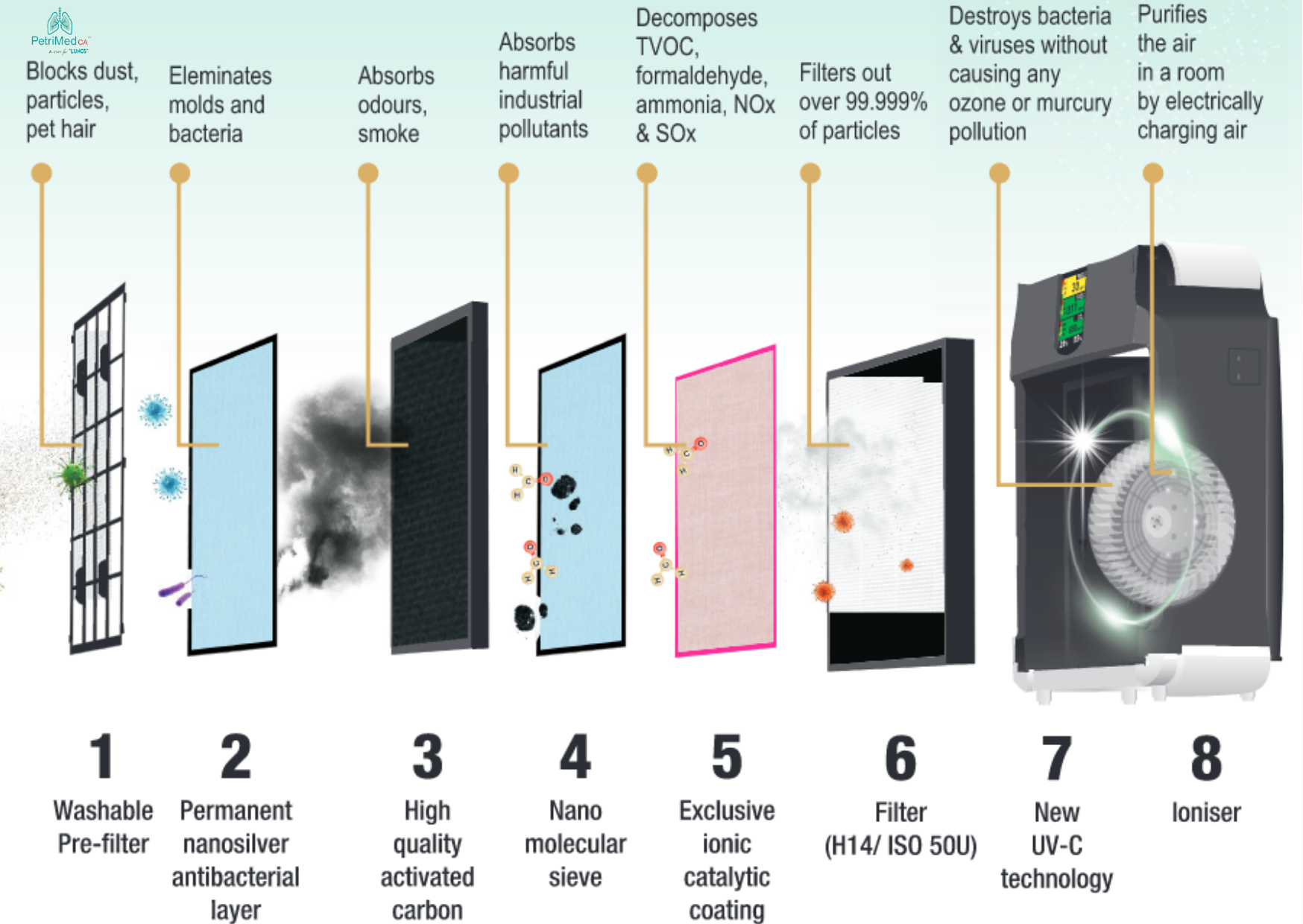Medical-Grade HEPA Filter vs. Other HEPA Filters: How HEPA 14 Scores Over the Others
22 Jan 2022
· HEPA is a pleated mechanical filter that is efficient to trap more than 99% of dust, pollen, microbes, and airborne particles
· Unlike medical-grade HEPA filters, regular ones are ineffective to purify all types of airborne particles
· PetriMed CA Air Purification System uses a medical-grade HEPA filter (ISO 50 H) that is efficient to capture 99.999% of air pollutants—which is higher than the standard laid by the Environmental Protection Agency
· People who look forward to removing the maximum number of airborne fine particles should go for a fully-loaded air purification system engineered with multi-layered filtration technologies, including a HEPA-14 grade filer
To be at its effective best, a HEPA (High-Efficiency Particulate Air) filter needs to be engineered with some other features to remove other types of tiny particles such as Volatile Organic Compounds (VOCs), gaseous pollutions, microbes, and others.
A HEPA (High-Efficiency Particulate Air) filter is an integral part of air purification systems, functioning to trap and remove tiny particles to keep the indoor air clean and healthy. But there are countless fallacies around the HEPA standard—whether or not investing in a particular air purifier is worthwhile.
Since it is clinically proven that HEPA filters are efficient to trap several types of indoor pollutants, some important points regarding the filter type need to be mulled over.
Let’s have a look at how HEPA filters work and what the HEPA standard stands for:
What is HEPA?
HEPA stands for High Efficiency Particulate Air, which is laid by the U.S. Department of Energy to reduce the spread of air pollution and infection due to nuclear tests during the 1940s. With remarkable efficacy of removing the airborne particles, it has since emerged as an ideal filter for modern air purification systems as part of their objective to reduce the concentration of indoor air pollutants.
[“On an average, reduction in particulate matter (PM) concentrations over southern part of India is around 50-60%, and over the Indo-Gangetic basin, including Delhi, UP, Bihar, West Bengal etc it is as much as 75%.” — S K Satheesh, Professor at Centre for Atmospheric & Oceanic Sciences, Indian Institute of Science (IISc) Bangalore]
As stated by the Environmental Protection Agency (EPA), it is a pleated mechanical filter that is efficient to trap more than 99% of dust, pollen, microbes, and airborne particles.
Can an Ordinary HEPA Air Purifier Work?
It would be unrealistic to say that an ordinary air purifier with an only ordinary HEPA filter would be effective in fighting indoor air pollutants at length—it needs to be engineered with some other features to remove other types of tiny particles such as Volatile Organic Compounds (VOCs), gaseous pollutions, microbes, and others.
Instead of investing in an ordinary device, try an air purification system that uses not only a HEPA filter but also a pre-filter, carbon filter, UV-C disinfector, and ionizer to ensure maximum purification in a closed environment.
A popular name called PetriMed CA Air Purification System uses a medical-grade HEPA filter (ISO 50 H) that is efficient to capture 99.999% of air pollutants—which is higher than the standard laid by the Environmental Protection Agency.
Medical-Grade HEPA Filter vs. Ordinary HEPA Filters:
Unlike medical-grade HEPA filters, regular ones are ineffective to purify all types of airborne particles. Though it is flexible how many tiny particles ordinary filters can trap and kill, they do not have the efficiency to remove 99.999% of particles as small as 0.1 microns in size.
Non-medical-grade filters are less compact and therefore incapable of capturing the smallest and most damaging particles.
Most Powerful: Medical Grade HEPA:
Though a filter either meets or fails the HEPA standard, but the filtration efficiency may be different and it is largely used to classify the filters amongst one another.
Non-medical-grade HEPA filters usually fall between H10-H12 grade, which is usually used in ordinary air purifiers in India, capturing up to 99.5% of indoor particles. On the other hand, medical-grade filters, levelled as H13-H14, can trap 99.995% particles of all types—some advanced air purification systems like PetriMed CA APS400 capture even more numbers of particles with 99.999% efficiency.
Medical-grade HEPA filters are usually recommended for the indoor environment where high filtration efficiency is required to remove harmful toxins and airborne particles.
People who look forward to removing the maximum number of airborne fine particles should go for a fully-loaded air purification system engineered with multi-layered filtration technologies, including a HEPA-14 grade filter.
